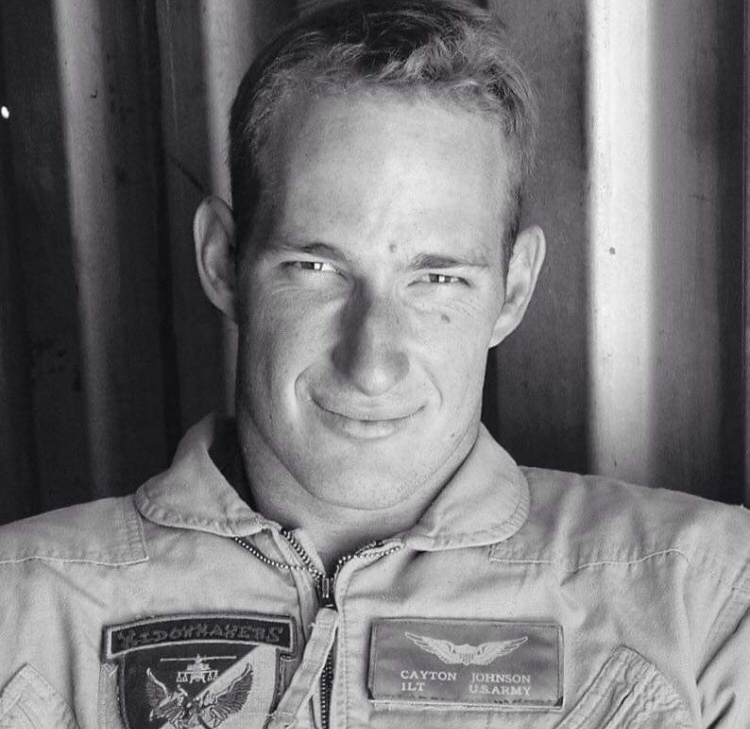APRIL 2021 NEWSLETTER
In this newsletter, we profile Army Aviator Cayton Johnson, who is retiring this month after 22 years of active service to the nation. He was kind enough to spend a couple of hours sharing his thoughts about the 9:57 Project even as he was in the process of painting his childhood home in Charleston, South Carolina. Cayton and his family are moving there after a final duty assignment in the Washington, D.C. area.
Cayton began his service as a Platoon Leader in the 101st Airborne Division, where he went on the first of numerous overseas deployments in the days following September 11th. His last deployment was as the Commander of the Air Cavalry Squadron of the 101st Airborne Division. Cayton has also served in a number of Joint Service and Army staff assignments at the Pentagon.
Cayton participated in a 9:57 Project trip to the Flight 93 National Memorial in Pennsylvania in 2017. There, he facilitated a small group discussion with high school students about 9-11, Flight 93, courage, service, and resilience. He also personally formulated and implemented a plan to take one of the participating students, Isaiah Hawkins, to the Pentagon. Isaiah was born on September 11th. There was a time in his life that sharing a birthdate with the events of the day in 2001 was a tough thing, but with a little help from Cayton, Isaiah came to embrace his birthday proudly. You can read more about Isaiah's story on our website.
As Cayton transitions to civilian life, he is well aware of the significant mindset shift required to
leave the values-based profession of arms to new employment, where, as he explains, “the free market may not think you are as valuable.” Many times, a veteran’s identity is so shaped by the years of high operational tempo that the new reality can be quite stark when the ride stops. A few moments of discussion with Cayton Johnson reveals he has considered these new facets of his next phase and has studiously applied a mindset that is a model of resilience for all. “Who we are is so much more than what we’ve done.” Cayton refuses to be defined by his military resume, despite his impressive record of service. However, he is still aware of the power of anyone’s story to continue to guide them in the future. For Cayton, as it is for many veterans, serving the nation’s people and the soldiers to the left and right of him, is a critical component of who he is. He is adamant that service to others will continue to be a defining feature of his life after the military.
He considers the 9:57 Project a superb way to these ends, particularly in relating the power and responsibility of citizenship to younger generations. “There is some danger in the idea that all the good generations are gone. We have to build up our younger generations, not tear them apart. You surely don’t do that by berating them.” When 9:57 Project veterans sit down with a group of students, they guide serious and honest discussions about history, where students are empowered to ask tough questions. The setting lends itself to sharing both personal stories like Cayton’s and our nation’s stories and how these young people will have to continue writing them one day. In a way, Cayton embodies this dual vision as he retires: one eye looking at the past for guidance, and the other focusing on the future and new opportunities. He embraces his volunteer efforts with us, saying, “There are few organizations like the 9:57 Project that offers veterans the ability to come to grips with what their story is.”
Cayton sees the need for more understanding of military culture by those who are unfamiliar with it. One participating student seemed to capture how the 9:57 Project can bridge the divide between civilians and the military when they wrote, “I learned that veterans are people too, just like me.” Moreover, the unique nature of the Flight 93 story helps bridge this divide. According to Cayton, “The story of Flight 93 is a bridge to cover the civilian-military gap that sometimes exists in society today, because such a small amount of our population has served in uniform.” The unique sacrifice of those on the flight demonstrates that one doesn’t have to wear a uniform to serve one's fellow countrymen. The role of 37 Americans and three passengers from other nations highlights the freedoms and responsibilities of citizenship. “We should elevate the respect of everyday citizens. Being a citizen is a powerful thing.” True service in all ways should be honored, celebrated, and encouraged, no matter what form it takes.
When asked about inviting Isaiah to the Pentagon, his purpose was not only to make a positive impact on a young man and his personal story but to provide him with a new perspective on a symbol of American military strength. And what a perspective it was, as the two of them literally walked down the wood-paneled corridors of power. Now, to Isaiah, the Pentagon isn’t only a symbol of military power, it is a place where people come to do their work, day in and day out.
We thank Cayton for his past military service and future service to his community, and we also honor his wife, Robin, who recently retired from a 26 year Army career, as they and their two kiddos settle down after a wild adventure. Cayton reflected on this part of his life by saying, “I got to share a profession with my best friend for two decades, who happens to be my wife.”

Cayton relinquishes command of the 2-17 Cavalry Squadron of the 101st Airborne Division

